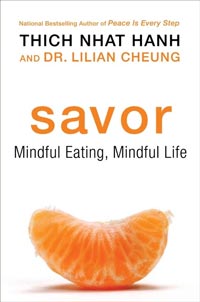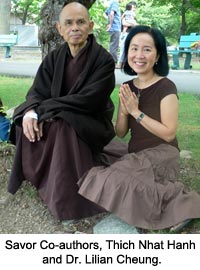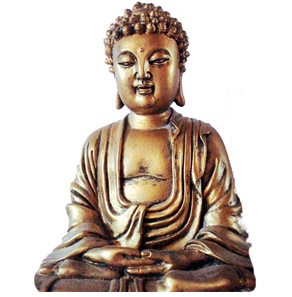In Savor, Harvard nutritionist Dr. Lilian Cheung says the Buddha holds the secret to enlightened minds and lighter bodies.
 When Lilian Cheung first met Zen Master Thich Nhat Hanh (known as “Thay” to his millions of followers) she thought she had found the fountain of youth. “Thay is 85 years old, but his mind is so lucid. He was exposed to agent orange for years in Vietnam, but he looks incredible. On his retreats he wakes up at 5:30 and leads a morning exercise of Thai Chi. A lot of the younger folks can not keep up with him!” Thay’s secret, according to the book, is mindfulness, an ancient Buddhist practice that can help you finally stick with healthy habits such as eating right and exercising. FOF spoke with Dr. Cheung about Savor and her own quest to become “a part-time Buddha.”
When Lilian Cheung first met Zen Master Thich Nhat Hanh (known as “Thay” to his millions of followers) she thought she had found the fountain of youth. “Thay is 85 years old, but his mind is so lucid. He was exposed to agent orange for years in Vietnam, but he looks incredible. On his retreats he wakes up at 5:30 and leads a morning exercise of Thai Chi. A lot of the younger folks can not keep up with him!” Thay’s secret, according to the book, is mindfulness, an ancient Buddhist practice that can help you finally stick with healthy habits such as eating right and exercising. FOF spoke with Dr. Cheung about Savor and her own quest to become “a part-time Buddha.”
 FOF: You’ve been a nutritionist at Harvard for many years. How did you get involved with Thich Nhat Hanh?
FOF: You’ve been a nutritionist at Harvard for many years. How did you get involved with Thich Nhat Hanh?
- Dr. Cheung: I attended his first retreat in 1997 in Key West. I got a brochure in the mail at home. The subject of the retreat—Touching More Peace and Joy in Your Life–was very interesting to me. It was a hectic time in my personal and professional life. I have three kids.
- FOF: You’re a busy FOF.
- Dr. C: Yes. So I went to the retreat. Over nine hundred people attended.
- FOF: Wow.
- Dr. C: We spent nine days together and half of the retreat was in total silence. We practiced mindful eating, mindful walking and mindful breathing. Thay was teaching mindfulness in a very experiential way.
- FOF: What exactly is mindfulness?
- Dr. C: Being aware and present in the moment so that we can focus on the truth.
- FOF: Can you give a real-word example?
- When you’re walking somewhere, you’re probably thinking about your work, or your kids or your next appointment. When you walk mindfully, you focus just on the walking. You connect your body and your mind together through breathing.
- FOF: I think I get it.
- Dr. C: Thay is very good at teaching you to integrate mindfulness into the most mundane, everyday routines. In the book we have the traffic jam meditation; the grocery line meditation—even the email meditation. Before you send an email, take three deep breaths to so you can calm down and focus on the task at hand. That way, you don’t make any mistakes like sending to the wrong person!
- FOF: I love that. How does this apply to eating and diet?
 Dr. C: As a nutritionist, I know how to tell people to eat more fruits and vegetables, but the difficult part is sticking with it! Through mindfulness, we can actually change our brains and maintain these habits.
Dr. C: As a nutritionist, I know how to tell people to eat more fruits and vegetables, but the difficult part is sticking with it! Through mindfulness, we can actually change our brains and maintain these habits.
- FOF: Okay, so how would you incorporate mindfulness into how you eat breakfast in the morning
- Dr. C: When you prepare your breakfast, just do that one thing. Cooking is a great way to practice mindfulness, because if you use a knife and you’re not mindful, you’re going to hurt yourself. When I sit down to eat, I stop and meditate on the “Five Contemplations” that we feature in the book, including “This food is the gift of the whole universe: the earth, the sky, numerous living beings, and much hard, loving work.” Make sure you chew well and you don’t serve yourself too large a portion. Then, engage your five senses while you eat.
- FOF: What do you eat for breakfast?
- Dr. C: When I’m in a hurry: whole grain bread with almond butter, finely shredded fresh mint and blueberries sprinkled on top.
- FOF: That sounds delicious.
- Dr. C: When I have more time, I make cooked cereal–oatmeal or barley. I add a little miso for flavor, wakame seaweed and nuts. I pour the hot cereal into a bowl with some mint leaves swirled in sesame oil.
- FOF: That’s a nice ritual.
- Dr. C: Yes, choosing the food, appreciating it, and using my five senses are all part of mindfulness. When people eat in front of their desks or even at a “working lunch,” they are not savoring or appreciating the food. In order to feel satisfied, you need to take time to savor.
- FOF: What would you say to a woman who only has time for coffee?
 Dr. C: Get some nuts and an apple. That gives you healthy fiber and healthy fats, plus it’s delicious.
Dr. C: Get some nuts and an apple. That gives you healthy fiber and healthy fats, plus it’s delicious.
- FOF: What about if you love your chocolate croissant?
- Dr. C: Portion size is important. Just don’t eat a giant croissant. It’s okay, you’re not supposed to be so pure all the time. I would suggest supplementing it with some nuts if you’re on the run.
- FOF: How do you stick with this program and stay mindful?
- Dr. C: The best way to break a bad habit is to have a buddy who is already practicing mindfulness. Support is very important. Thay has Sanghas—groups of mindfulness practitioners–all over the world. There’s a directory on his site. You can look up a sangha in your area and just go to a meeting. People there will be open to being your buddy. These are very thoughtful people. And there’s no charge.
- FOF: It’s cheaper than Weight Watchers!
- Yes! And it’s so nourishing because the atmosphere is very compassionate.
- FOF: Are there things you can do on your own as well?
- Dr. C: You need to set up triggers to catch yourself in a moment. At Thay’s retreat center at Plum Village, every time the phone rings, you take three breaths and wait three rings before you pick it up. There’s a mindfulness clock on our website that you can download and it will ring on your computer.
- FOF: That’s very cool.
- Dr. C: Most importantly, don’t judge yourself if you don’t do everything right. It’s not an all-or-none phenomenon. When I started in 1997, I would say my “Buddha-hood” was about 5 percent. Today my Buddha-hood is more like 70 percent, because I am more conscious about the practice. The Buddha is 100 percent, but it’s okay to be a part-time Buddha. Just keep going in the right direction.
- FOF: You have a very soothing manner.
- Dr. C: When you increase your mindfulness, people see it and feel it. The wonderful thing is, you look different, and you behave different, and people want to be like you because you exude calm.
- FOF: You’re making me calm! What would you love to tell a room full of FOFs just like you?
 Dr. C: They may think that because they’re over fifty, it’s not possible to change. That’s not true. Any moment is an opportunity for change, because in Buddhism nothing is permanent. I want to offer you these words of wisdom from Thay: ‘The past is already gone. The future is not yet here. We only have the present moment. If we miss the present moment, we miss our appointment with life.’
Dr. C: They may think that because they’re over fifty, it’s not possible to change. That’s not true. Any moment is an opportunity for change, because in Buddhism nothing is permanent. I want to offer you these words of wisdom from Thay: ‘The past is already gone. The future is not yet here. We only have the present moment. If we miss the present moment, we miss our appointment with life.’
- FOF: That’s great.
- Dr. C: Isn’t it wonderful?
- FOF: It’s making me think, oh no, I missed that appointment.
- Dr. C: Ha! And you wouldn’t miss a doctor’s appointment.
| Author | |
 |
Director of Health Promotion & Communication at HarvardDr. Lilian Cheung is a Lecturer, Director of Health Promotion & Communication, and Editorial Director of The Nutrition Source website at the Harvard School of Public Health’s Department of Nutrition. Her work focuses on translating nutrition science into multimedia resources and community programs that help children, adults, and families lead. |


0 Responses to “Practice Zen To Lose 10”
linaperl says:
I interviewed Dr. Chang for this story and she is a true inspiration! It was such a joy to speak with her. Thanks for your great comments. Check out her website: http://www.savorthebook.com
floggingwally says:
I will so try to practice more calm and mindfulness on a daily basis. Thank you, Dr. Cheung!
gbarlow320 says:
Thanks for some wonderful advice I am anxious to put it to work in my life.
cobrateacher says:
I retired last week, and the time I finally have is great. Now I can finally work on healthier practices and serenity! I needed that, and your hints will help a lot!